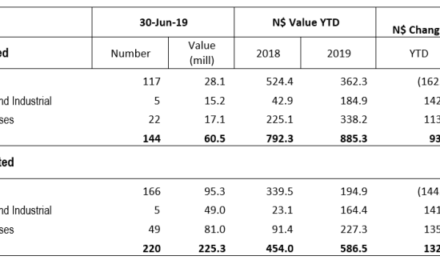
Retail Sector Charter enters next round

Closing ranks for a project of national importance. Hon. Immanuel Ngatjizeko (centre) described the Namibia Retail Sector Charter as an assignment of national importance. He is here flanked, f.l.t.r, by Dr Michael N. Humavindu (Chairperson: Building Materials/Hardware), David Namalenga (Chairperson: Clothing/Apparels), Ndiitah Nghipondoka-Robiati (CEO: Namibia Trade Forum) and Henry Feris (Chairperson: Fast Moving Consumer Goods/FMCGs). Photograph by the Namibia Trade Forum.
The Namibia Retail Sector Charter lays out principles and targets to facilitate greater access to the retail market for local beneficiaries.
The meeting was not clear whether the main focus is access for Namibian products, or acquisition of shareholding by Namibians.
The event organised by the Namibia Trade Forum saw the presence of the Minister of Industrialisation, Trade & SME Development, Hon Immanuel Ngatjizeko.
The Charter currently faces challenges such as definitional issues which are linked to the retailers’ different business models. These relate to product and supplier categories.
An estimated 70 representatives comprising retailers, distributors, logistics companies, regulators, as well as wholesale and retail unions also attended to see progress as there are a several developments in the sector which need dialogue and consulting.
Participants discussed the status of the proposed Retail Sector Charter with emphasis on its aim, mechanisms, stakeholders, project milestones and transformational principles.
Solutions from the meeting are to ensure relevance of the Charter across the different retail models, to further intensify engagements with non-participants through awareness creation and communication.
Ngatjizeko described the Retail Charter as a project of national importance. Urging participants to work together in a spirit of goodwill and dialogue, he also said that the charter aims to achieve economic inclusiveness, job creation and poverty eradication.
The chairpersons of the three Task Teams (Fast-moving consumer goods, Building Materials/Hardware and Clothing/Apparel) each presented an overview of their activities since September 2014.
The charter is set to be implemented during the third quarter of 2015.
The charter facilitates the creation of a suitable climate for local contribution to the value chain as well as to facilitate job creation amongst other growth targets.
This intervention forms part of the “Growth at Home” strategy’s key priority area “Securing market access at home and abroad”.
Other significant issues raised were the non-participation of leading retailers, limited local decision making capacity due to foreign ownership and control of retailers, and the fact that participation is voluntary.
Targets were also agreed on and to source specialised expertise who will develop a measuring tool.
The next round of Retail Charter working meetings is scheduled for 18 and 19 August 2015 in Windhoek.











































